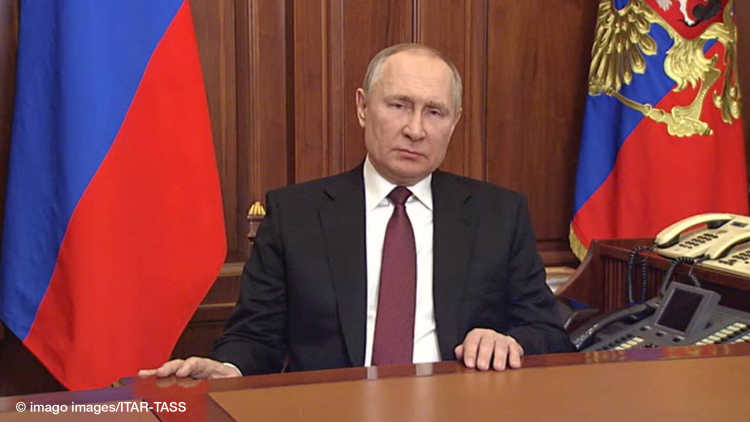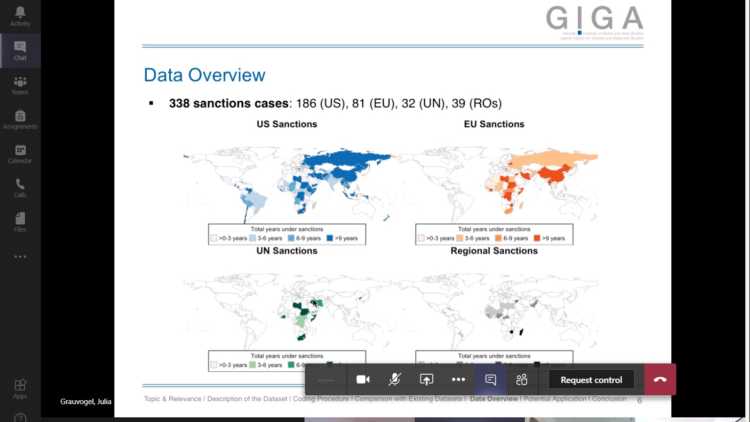- Home
- Research & Transfer
- Research Projects
- The Termination of International Sanctions: Causes, Processes and Domestic Consequences
The Termination of International Sanctions: Causes, Processes and Domestic Consequences
Sanctions termination has become a ubiquitous phenomenon in international politics. Controversies about cases such as Cuba, Iran, Russia, and Zimbabwe exemplify the contested nature of policy debates about the termination of sanctions. Yet, research has focused on sanctions’ implementation and effectiveness, directing little attention towards their removal. This project examines the causes, processes, and consequences of ending sanctions. It combines cross-national analyses based on the first global dataset on sanctions termination with in-depth case studies covering different regions.
DFG, 2018-2021
Team
Head
Research Questions
With the proliferation of sanctions after the end of the Cold War, the termination of these measures has become a ubiquitous phenomenon in international politics. Yet, research has hitherto focused on sanctions’ implementation and effectiveness, whereas their termination has received little attention. The controversy about whether sanctions against Cuba, Iran, Russia, and Zimbabwe should be lifted exemplifies the contested nature of policy debates about the termination of sanctions. We also lack systematic knowledge about the divergent causes and volatile processes that lead to the termination of international sanctions. It remains unclear why some measures are lifted in response to minimal concessions while others remain in place until all goals are accomplished. Moreover, research on sanctions typically stops when sanctions are lifted, meaning that scholars have ignored the domestic consequences of ending external pressure. To address these puzzles, the project tackles the following three research questions: How can we capture the process of ending sanctions? Why do sanctions end? What are the consequences of lifting sanctions?
Contribution to International Research
Empirically, it introduces a new dataset that contains information on the termination of all UN, EU, US, as well as regional sanctions between 1990 and 2018 worldwide. Based on this novel data, the project systematically examines the causes of sanctions termination. In contrast to prior research that has mostly treated the end of sanctions as a single category, our analysis disaggregates sanctions termination and compares these different pathways. Finally, it explores the impact of the causes and processes on consequences of ending sanctions for the target states.
Research Design and Methods
The project applies a multi-method research design. In a first step, we compile a novel ‘International Sanctions Termination’ dataset. It contains information on expiry dates, review provisions and termination requirements and captures the gradual process of ending sanctions. The cross-national empirical analysis using this data will serve as a basis for the development of more complex explanations for the termination of sanctions that go beyond single causes and the assumption that what leads to the imposition of sanctions also inversely causes their termination. Based on the large-N analysis, case studies will be selected to examine the domestic consequences of ending external pressure, as these consequences most likely depend on the processes and causes of sanctions termination. To ensure cross-regional comparison, cases from different world regions will be chosen.
Preliminary Findings
In our novel data, we also find cross-national evidence for the gradual nature of sanctions termination. We hence conceptualize sanctions termination as a volatile and often inconclusive process shaped by multiple interactions between senders and targets (Grauvogel and Attia 2019a). The removal of sanctions does not only lift economic constraints, but also signals the end of the targeted regime’s international political isolation. This can be heavily contested, as controversies in the cases of Iran or Zimbabwe exemplify (Grauvogel and Attia 2020).















